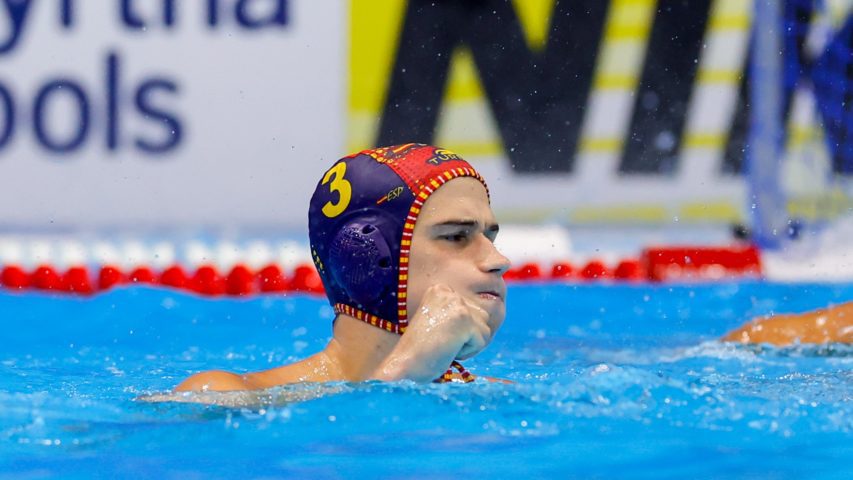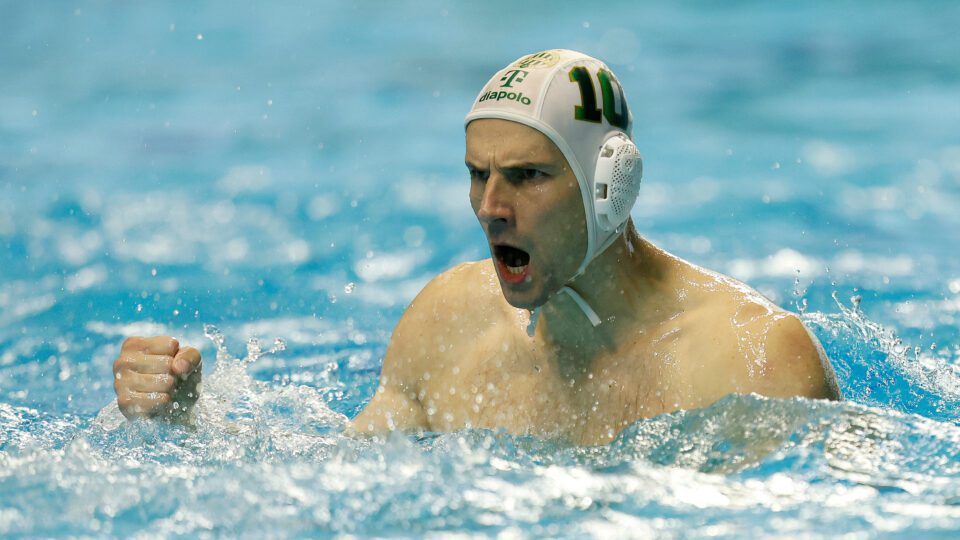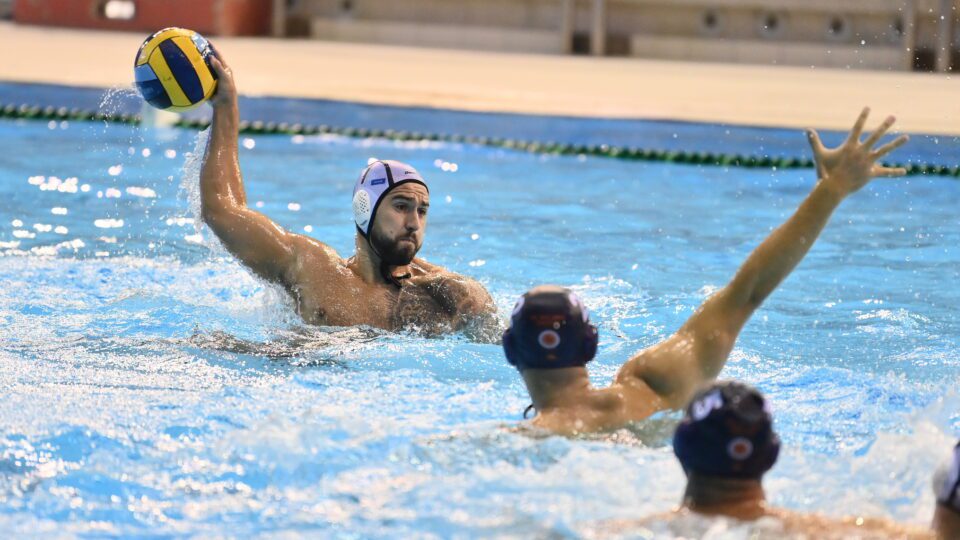Title-holder Spain opened the male tournament at the 20th World Championships in Fukuoka with a 16:14 victory over Serbia in the highlight of Day 1.
The world champions broke the rival with a 7:0 run in the first half, turning around a 0:2 deficit to a 7:2 lead. Serbia didn’t give up, and played much better in the second half. It narrowed the gap to three several times. The Serbs came even closer to the favorite at the finish, but Spain’s win wasn’t in big danger.
Some of the favorites struggled, and some cruised to wins, but the first day produced more or less expected outcomes.
Greece beat Australia 13:9 and Team USA downed Kazakhstan 15:8 in Group A. Italy was better than France – 13:6 in the derby of Group B, where Canada defeated China 13:10.
European champion Croatia opened the tournament with a 25:4 win over Argentina in Group C. Hungary had troubles at the beginning of the second match in this group, but a comfortable 16:8 victory over host Japan.
Montenegro achieved the biggest win of the day, beating South Africa 35:10 in Group D. The day was closed by the mentioned encounter between Spain and Serbia in the same group.
M The results, live scores, statistics from the men’s competition are available here
20th World Water Polo Championship (Fukuoka, July 17 – 29), Men, Day 1
Group A
Australia – Greece 9:13 (2:2,1:3, 3:3, 3:5)
A few months ago, Greece ran over Australia in the World Cup Division 1 in Podgorica (20:5). The “Aussie Sharks” have improved their play since March and kept up with the Greeks for more than three quarters.
The bronze medalists from the previous championships, who arrived in Fukuoka without Angelos Vlachopoulos, secured a four-goal win only at the finish.
Australia took an opening 1:0 and 2:1 lead. Greece made a 3:0 run for a 4:2 lead. The Greeks, led by Stylianos Argyropoulos, maintained a 2-goal difference until 6:4.. However, Australia managed to catch up with the Europeans midway through the third period. Nathan Powe netted a very nice goal for 5:6. Two minutes after, one of the players who should be Australia’s leader Luke Pavillard found the net for the first time for 6:6 (it was his only goal). Between these two goals, Greece didn’t convert a penalty (Fountoulis hit the post).
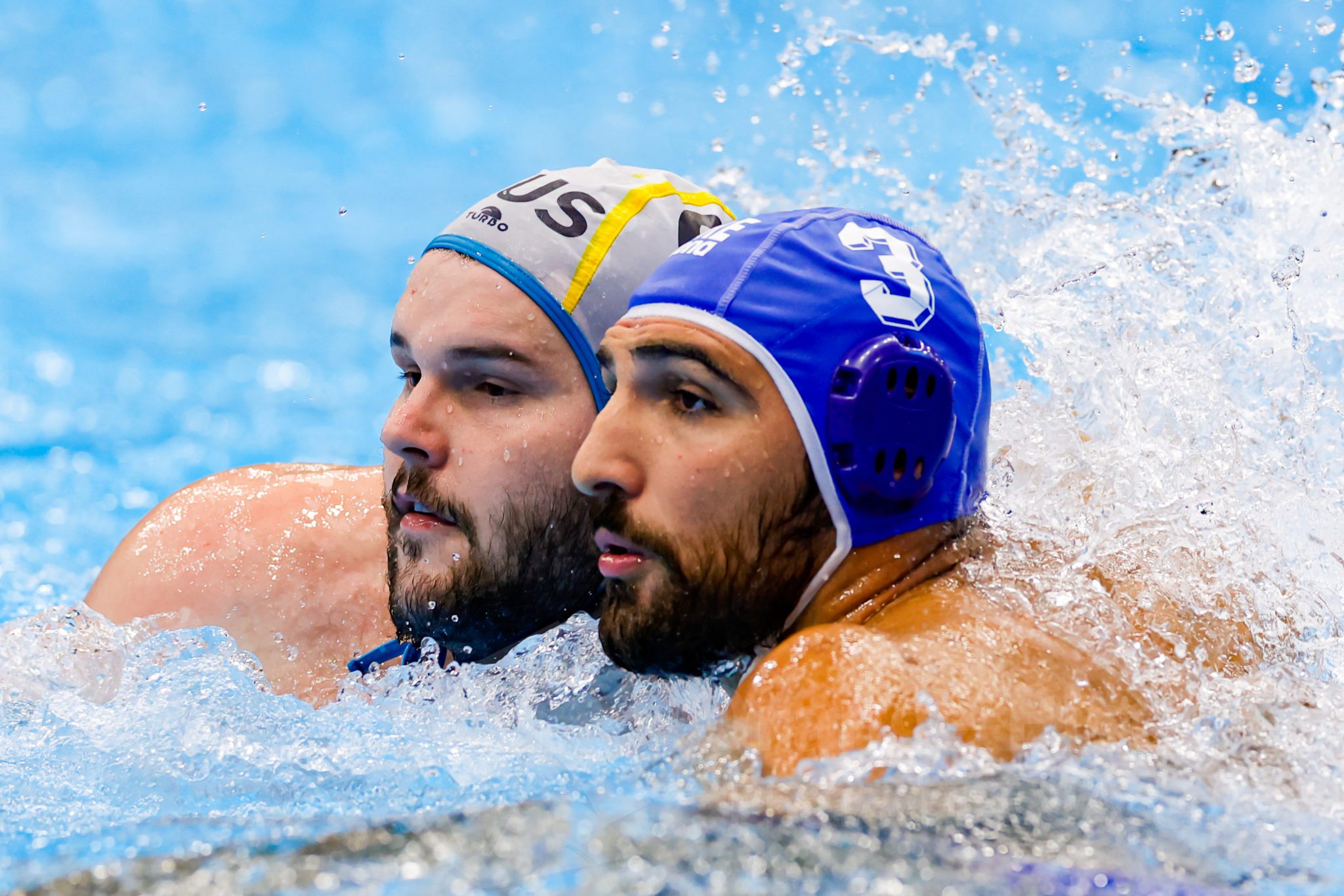
Lachlan Edwards (Australia) and Dimitrios Skoumpakis (Greece) All photos by Albert ten Hove/Orange Pictures
Greece rebuilt a 2-goal lead before the fourth period. Skoumpakis and Kalogeropoulos made it 8:6. However, the battle wasn’t over. Australia continued its chase and cut the deficit to one twice in the fourth quarter (7:8 and 8:9). Then, the Europeans scored three consecutive goals and finally broke Australia’s resistance. Argyropoulos opened the series with a shot from a distance, Fountoulis converted a man-up, and Gendiounias made it 12:8 from a penalty shot with 01:14 minutes left on the clock, and the Greeks pocketed the points.
Australia’s Nathan Power hit the back of the net four times today. The best scorer in the winning team was Stylianos Argyropoulos with three goals. Greece converted five of its 11 man-ups, and Australia’s conversion was 3/9.
Kazakhstan – USA 5:18 (1:5, 4:4, 0:4, 0:5)
The USA had a great start and took a 5:0 lead. The Kazakhs got on the scoreboard 49 seconds before the first break. The second period was balanced, but the second half was a one-sided contest. The Americans didn’t slow after earning a double-digit lead (15:5 in the 28th minute). and they increased the margin to 13.
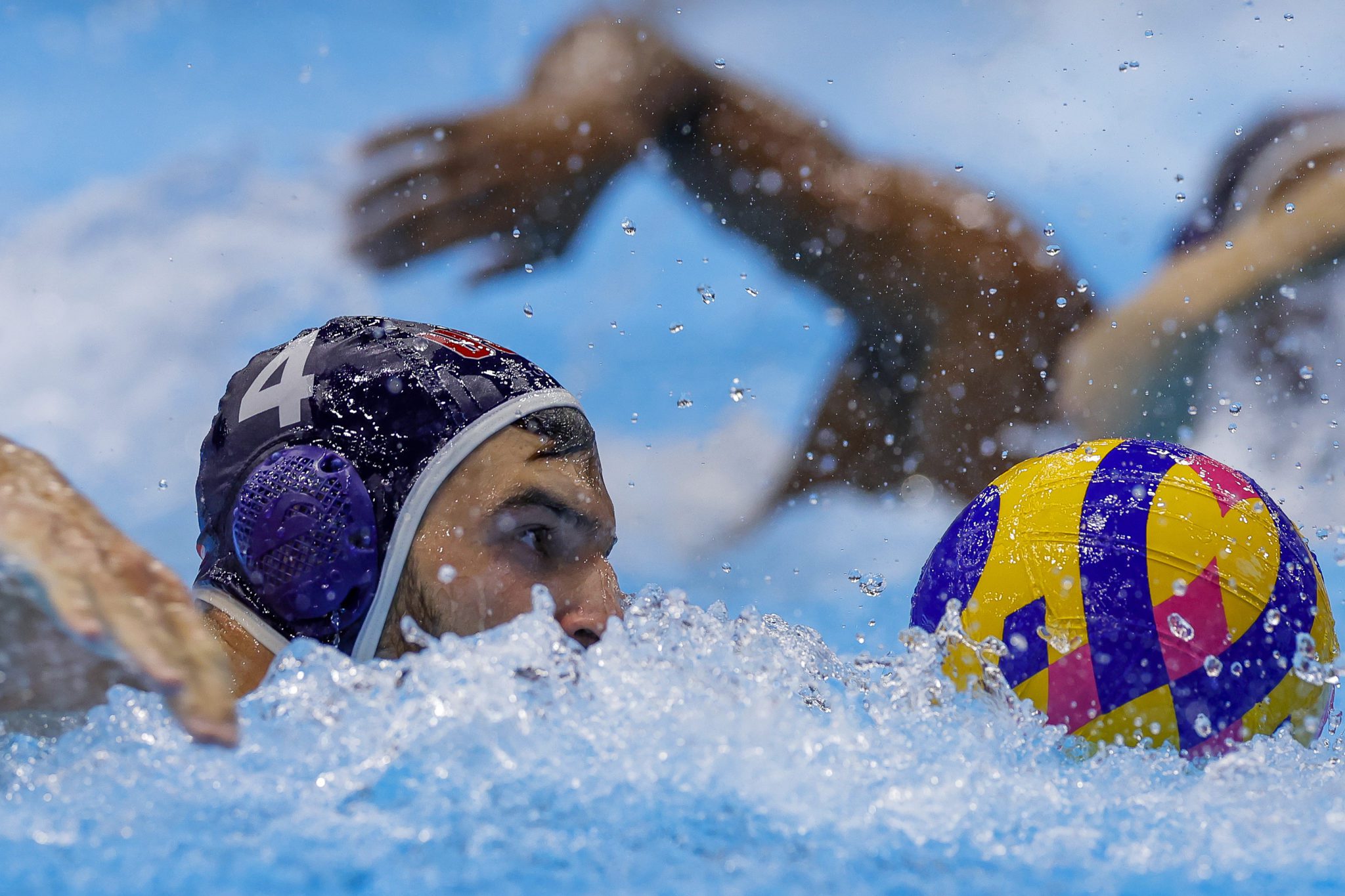
Tyler Abramson (USA)
Tyler Abramson, who debuted in the World Championships, was the top scorer with five goals in five attempts, while Johnny Hooper added three. Dusan Markovic scored three for Kazakhstan.
Day 2 (July 19): Greece – Kazakhstan, USA – Australia
Group B
France – Italy 6:13 (3:2, 2:3, 0:3 1:5)
The game that was considered the derby of the group was very similar to the encounter between the same rivals in Group A of the World Cup Division 1.
France started well, but the Italians ruled the field in the second half and took the points with a convincing win.
The teams traded goals in the first quarter until 2:2. Four seconds before the first break, Ugo Crousilla gave France a 3:2 lead. Mehdi Marzouki doubled the French’s advantage (4:2). The silver medalists from Budapest and Los Angeles answered with two goals for 4:4. In the 14th minute, Ugo Crousillat put the French in front for the last time by converting a penalty shot (5:4).

Marco del Lungo saved a penalty shot from Alexandre Bouet at the finish of the game Photo by Albert ten Hove/Orange Pictures
However, late into the second quarter, the course of the game started changing. Andrea Fondelli converted a double man-up before the middle break to equalize at 5:5. The Italians converted two of their three man-ups in the third quarter for 7:5. Fondelli stretched the margin to three with a goal from a direct foul. In the 26th minute, Di Somma concluded Italy’s series of five goals to make it 9:5. Shortly after, Alexandre Bouet ended France’s goalless phase that lasted almost 13 minutes with a powerplay goal (that was confirmed only after a VAR review). But Lorenzo Bruni replied immediately with a backhander. By the end, Italy widened the gap to seven.
The statistics say that the teams had similar percentages of shots, but Italy made double more chances, scoring 13 goals from 31 attempts (42%), and France netted six from 15 shots (40%).
Andrea Fondelli posed the biggest danger to France’s defense. He scored four goals (three from action). Ugo Crousillat and Enzo Khasz netted two each for France.
Canada – China 13:10 (4:0, 3:6, 4:4, 2:0)
If China had not started badly, it might have won points in this match. The Asians recovered from a bad 0:4 start, but they never equalized.
Canada scored only one action goal in the first quarter (Cote for 1:0 in the 2nd minute). In the following six minutes, the North Americans found the net twice from the 5m line and once from a 6 on 5 for a nice 4:0 advantage at the first break. Besides, they missed two man-ups. Interestingly, Canada didn’t commit a personal foul in the first quarter, so China didn’t have man-up opportunities.

Nicolas Constantin-Bicari (Canada)
In the second quarter, China converted all of its shots after the Canadians’ fouls (one penalty shot and two 6 on 5s), added three action goals and cut the deficit to one (4:5, 6:7). During the third quarter, the teams exchanged goals and Canada kept a minimal advantage before the fourth quarter. Nicolas Constantin-Bicari opened the final period with a powerplay goal. In the following minutes, both defenses dominated. Thirty seconds from the end, Bogdan Djerkovic killed China’s last hope with an action goal to set the final score – 13:10.
Three goals separated the rivals, while the difference in exclusions was significant. The Chinese committed 14, and Canada only five personal fouls. China converted two of its four powerplays and the only penalty. Canada had a perfect penalty shots conversion (4/4) and scored three goals from 8 attempts with an extra player.
Nicolas Constantin Bicari and Aleksa Gardijan scored three each for Canada, but the best scorer was China’s Jianhao Peng, with four goals from as many shots.
Day 2 (July 19): Italy – Canada, China – France
Group C
Hungary – Japan 16:8 (4:4, 3:2, 3:1, 6:1)
The same story has been repeated from tournament to tournament. Even the best European teams almost always need a lot of time to adapt to Japan’s atypical style of play. But, in the end, a favorite almost always wins.

Gergo Zalanki (HUN) and Toi Suzuki (JPN)
Hungary beat Japan by ten goals in the World Cup Division 1 in Zagreb (17:7). The result was similar today, but only because of Hungary’s strong fourth quarter.
The hosts, supported by a few thousand fans, made a lot of trouble to the Hungarians with a deep pressing in defense. They often changed their formation in the attack (sometimes, they played without a center-forward). Hungary built a 2:0 in the opening minutes. However, it couldn’t find enough solutions to stop the Japanese’s dangerous shots from the perimeter.
The hosts turned around the score and earned a 4:3 lead in the first and 6:5 in the middle of the second period. Denes Varga leveled in the next possession from a difficult position. Nagy put the Hungarians in front (7:6), from a counterattack.
The Europeans started taking control. They killed Japan’s four 6 on 5s and kept the same level of play in the attack as in the first two periods. Two and a half minutes from the last break, Szilard Jansik gave Hungary a 10:7 advantage. Hungary opened the fourth quarter with four goals from quick attacks and went to a safe 15:7 lead (the 29th minute).
Gergo Zalanki and Szilard Jansik contributed to Hungary’s victory with four goals each.
Japan’s percentage of extra player shots was terrible – 1/9. That only powerplay goal came at the finish when everything was decided (for 8:15). Hungary scored three goals on extra (3/5). The difference in the steals is also big. Hungary stole 12 and Japan five balls.
Argentina – Croatia 5:24 (2:8, 1:4, 0:7, 2:5)
Water polo isn’t football so we couldn’t expect an interesting battle between Argentina and Croatia.
The European champion and the South American team that plays for the second time at the Word Championships aren’t in the same weight category.
The Croats scored eight goals in the first eight minutes, and seven players found the net. At halftime, Croatia was 12:3 up.
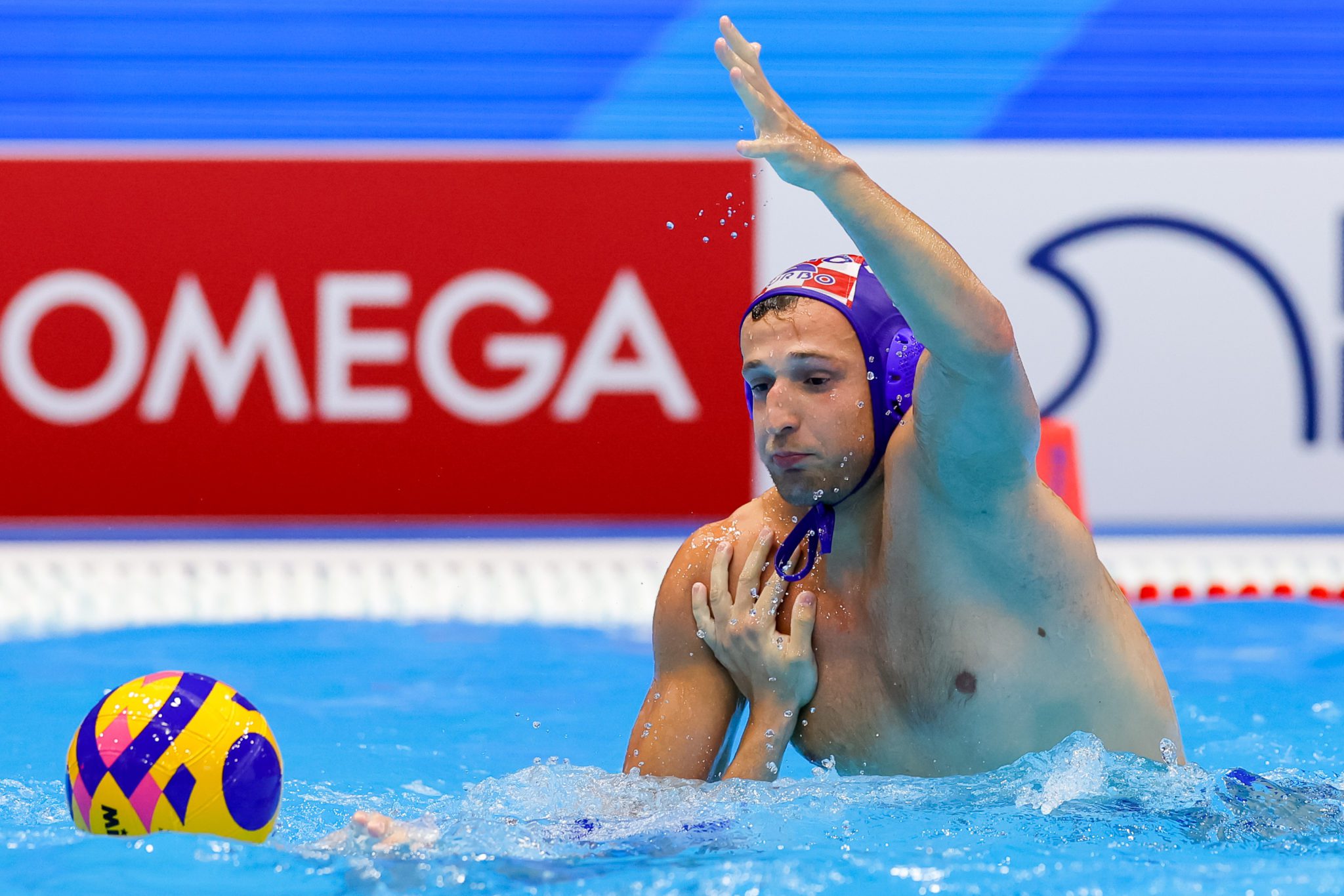
Guido Martino (ARG) challenged by Konstantin Kharkov (CRO)
The European champions produced a 9:0 run ten minutes into the second half and doubled their advantage to 21:3. They let the Argentines score two goals at the finish but still increased the margin to 19.
Ten field players in the Croatian team found the net. Jerko Marinic Kragic scored as many goals as all players of Argentina together – five. Ante Vukicevic followed him with four.
Day 2 (July 19): Croatia – Hungary, Japan – Argentina
Group D
Serbia – Spain 14:16 (2:3, 3:5, 5:5, 4:3)
It wouldn’t be correct to call the derby Spain – Serbia the clash between the world and the Olympic champion. Spain’s head coach David Martin fielded the same 13 players who won gold in Budapest last year. There are only five Olympic champions on Serbia’s roster in Fukuoka (goalkeeper Mitrovic, S.Rasovic, Randjelovic Lazic and captain Jaksic). The team is guided by a new head coach Uros Stevanovic.
Serbia’s win over Spain in the World Cup in March (17:15 – PSO) encouraged Serbia, which entered the match very well. Strahinja Rasovic scored two action goals to give his team a 2:0 lead. But, Alvaro Granados replied with two with an extra player (the second one was from a 6 on 4) and closed the first period with a counterattack goal to make it 3:2. The Spaniards imposed their rhythm in the second quarter and added five goals to go 7:2. After the world champions’ 7:0 run, Serbia’s head coach called a time out, which gave the result. Serbia earned a man-up, which Rasovic converted to 3:7 and ended Serbia’s silence that lasted for almost ten minutes. Shortly after, the same player added his fourth goal, this time from a penalty shot. By the middle break, the teams exchanged goals and Spain regained a 3-goal lead (5:8).
However, Serbia never recovered from a shocking 0:7 series.

Felipe Perrone (Spain)
The Spaniards needed less than a minute of play in the second half to restore a 5-goal lead. Perrone scored in Spain’s first possession and in the counterattack for 10:5., Serbia narrowed the distance to three (8:11, 9:12, 10:13). Still, Spain didn’t let the Serbs come back. The world champions netted three goals in the first three minutes of the final period for 16:10. The Serbs scored the last four goals in the match but weren’t close to an equalizer. Jaksic set the final score with 57 seconds left on the clock.
Alvaro Granados and Felipe Perrone combined more than a half goals of Spain (Granados five, Perrone four), Strahinja Rasovic topped the scorers’ list with six goals from seven shots. Nikola Jaksic hit the back of the net four times. Four goals that Spain scored from counterattacks were maybe the crucial factor that made the difference, along with eight power-play goals from the world champions (8/11). Serbia didn’t score a single from fastbreak, converted five man-ups (5/6) and two penalty shots (2/2).
Montenegro – South Africa 35:10 (6:1, 10:0, 9:5, 10:4)
Montenegro warmed up for the matches against Spain and Serbia and tested its abilities in attack. For the first time after 29 years, a team scored more than a goal per minute in a match at the men’s World Senior Championships (Croatia beat New Zealand 38:1 in Rome in 1994 – the game lasted 28 minutes then).
Nothing but Montenegro’s convincing win was expected in this match. The Montenegrins didn’t care much about defense in the second half. South Africa didn’t surrender until the final buzzer and scored nine goals in the third and fourth periods, and they could be satisfied with that feat.
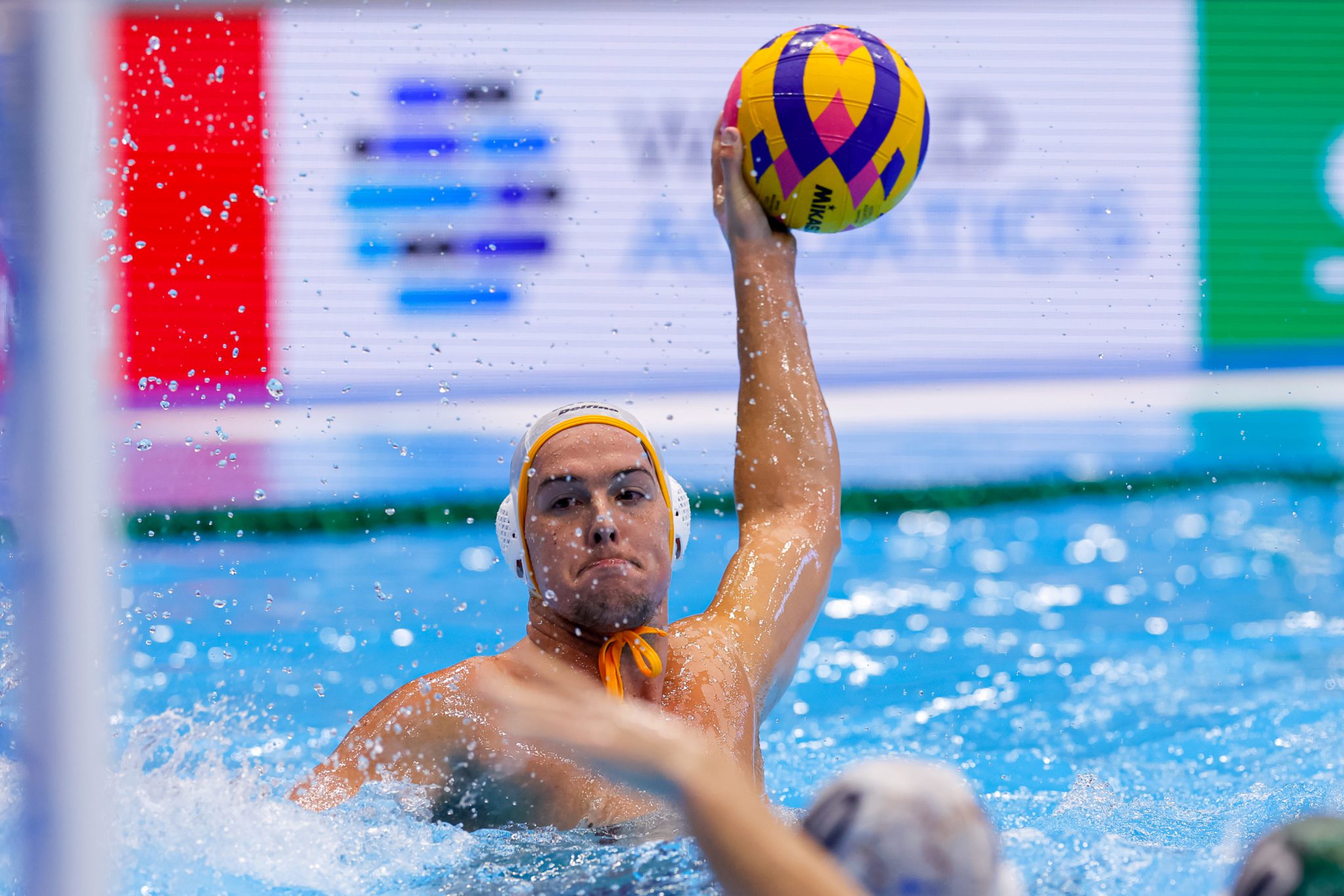
Djuro Radovic (Montenegro) Photo by Albert ten Hove/Orange Pictures
The Europeans scored even 14 goals from counter-attacks. All 11 field players got on the scoresheet. The best scorer and the player of the match was left-handed Djuro Radovic with seven goals (a perfect percentage of shots). Bogdan Djurdjic added five.
Day 2 (July 19): Spain – Montenegro, South Africa – Serbia.
For more news and the schedule about the upcoming Worlds, visit Total Waterpolo’s 2023 World Championships page.
More articles about the World Championships
Follow us on Facebook, Twitter and Instagram. For more video content, subscribe to our Youtube Channel and Tik Tok account



